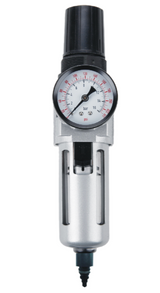Dry Pressure Gauges vs. Liquid-Filled Pressure Gauges: Choosing the Right Option for Your Needs
Are you in the market for an air compressor pressure gauge but unsure whether to go with a dry or liquid-filled option? Understanding the differences between these two types of gauges can help you make an informed decision based on your specific needs and requirements. In this guide, we'll explore the benefits of each type and provide guidance on when to use them.
Dry Pressure Gauges
Dry pressure gauges, as the name suggests, do not contain any liquid inside the gauge chamber. Instead, they rely on a mechanical mechanism to measure pressure. Here are some benefits of dry pressure gauges:
- Cost-Effectiveness:
- Wide Range of Applications:
- Ease of Maintenance:
Dry pressure gauges are typically more affordable than their liquid-filled counterparts, making them a budget-friendly option for many air compressor applications.
Dry pressure gauges can be used in a variety of industries and applications, including automotive, HVAC, and industrial settings.
Since dry pressure gauges do not contain liquid, there is no risk of leakage or spillage, making them easy to maintain and service.
When to Use Dry Pressure Gauges:
- For general-purpose applications where cost is a primary consideration.
- In environments where exposure to extreme temperatures or harsh conditions is not a concern.
- For air compressor applications where precise accuracy is not critical.
Liquid-Filled Pressure Gauges
Liquid-filled pressure gauges contain a liquid, typically glycerin or silicone oil, inside the gauge chamber. The liquid helps dampen vibration and pulsation, resulting in more accurate and stable readings. Here are some benefits of liquid-filled pressure gauges:
- Improved Accuracy:
- Enhanced Durability:
- Resistance to Environmental Factors:
The liquid-filled design helps dampen needle movement, resulting in more accurate and consistent pressure readings, especially in air compressor applications with high vibration or pulsation.
The liquid filling helps protect internal components from shock and vibration, extending the lifespan of the gauge and reducing the risk of damage.
Liquid-filled pressure gauges are better equipped to handle temperature fluctuations and harsh operating environments, making them suitable for outdoor or industrial applications.
When to Use Liquid-Filled Pressure Gauges:
- In air compressor applications where accuracy and stability are critical, such as hydraulic systems, pumps, and compressors.
- In environments with high vibration, pulsation, or shock loads.
- For outdoor or industrial applications where exposure to harsh conditions is likely.
Shop Pressure Gauges at Master Tool Repair
Ready to find the perfect pressure gauge for your needs? Explore our wide selection of pressure gauges at Master Tool Repair. Whether you're looking for dry or liquid-filled options, we have the products you need to keep your systems running smoothly. Visit our website to browse our inventory and place your order today!
With the right pressure gauge, you can ensure optimal performance and reliability in your systems, helping you achieve your goals with confidence.
Recent Posts
-
Why Dry Air is Non-Negotiable for Your Operations
In many industrial and commercial settings, compressed air is the lifeblood of operations. It powers …Jul 8, 2025 -
The Sound of Trouble: Diagnosing Strange Noises in Your Air Compressor
Your air compressor is a workhorse, a reliable partner for countless tasks. But what happens when th …Jul 2, 2025 -
Mastering Your Compressor: How to Set the Perfect Pressure for Any Job
One of the most frequent questions we hear at Master Tool Repair is: "What pressure should my air co …Jun 6, 2025




